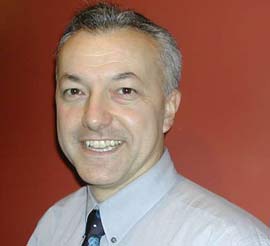'Asexual reproduction' produces stem cells
Researchers say rat embryos produced from the ' asexual reproduction ' process known as monoclinic reproduction suggest that ovule cells can be a valuable source of embryonic stem cells. The researchers said in the journal Science that the cells could be very suitable for the recipient's immune system, forming a potential source for transplants.
The researchers say there are fewer obstacles to developing these stem cells than using asexual reproduction techniques, also known as corpus luteum transfer techniques. Dr George Daley of the Children's Hospital and Harvard Medical School in Boston, who led the study, said: ' I think it's a much more realistic possibility than nuclear transfer .'

Dr. George Daley (Photo: pbs.org)
If the experiment can be simulated in humans, such cells could provide an alternative way to produce tissue suitable for transplantation or to study disease. He said: 'We are very aggressive and determined to produce embryonic stem cells of the monopharynx in humans.'
How did they do that?
The researchers say they have created dozens of genetically engineered mouse embryonic stem cell lines with a new method called monoclinic reproduction. The word comes from the Latin and Greek roots meaning ' beginning of virginity ' and this process takes place when an oocyte cell begins to divide to create an embryo without using sperm to fertilize.
The researchers created stem cells from unfertilized rats, tested them to make sure they were not removed by the rodent's immune system and then injected back into mice.
' Customized ' cells are successfully transplanted and produce many types of adaptive tissue, but not all, presumably because there are not any male DNA.
The study established the principle of using unfertilized oocytes as a source of ' customized ' embryonic stem cells that are genetically tested to ensure that they carry genes that allow the human immune system. recognize them, make them suitable for transplant therapies.
In the past, scientists have experimented with a single reproductive method in mice, but this is the first time this method has given birth to embryonic stem cells or so-called host cells that have the potential to generate develop into any other type of cell in the body.

Embryonic stem cells have been collected from mouse embryos created without sperm (Photo: abc.net.au)
The authors of the study especially felt encouraged because the mice had not been fertilized 70% of the time to produce embryonic stem cells. This implies that the technique of creating this much-needed genetic material is a much more practical and effective way than the current alternative, the transfer technology.
Dr Daley said these cell lines could also be studied to better understand the basic biology of disease. He said: ' For example, a woman with a genetic disease - like the early stage of Parkinson's disease, whose bone marrow is reduced - we can use these cells as in vitro models. about the disease. '
However, Dr. Daley warns that there are safety concerns regarding this method that require the ovule to be " fooled " chemically to " spew " half of the genetic material of it, leaving a set of female chromosomes. In particular, tissue obtained in this way may carry some risk of cancer or abnormal growth.
Dr Daley said: 'We will have to demonstrate the safety and durability of cells from embryonic stem cells with a single reproductive technique before we can imagine any usefulness. in clinical. '
What about human ovule?
However, Dr. Daley and his team began experimenting with this method on ovule, using discarded ovules of women who were in vitro fertilization treatment at the Brigham Women's and Women's Hospital. Boston.
Until now, they have not yet succeeded in separating human embryonic stem cells from these ovules that usually have a " life span " of 25 hours as soon as they reach the laboratory.
The team plans to find more volunteer women for their ovules for research purposes in a year or so from now with the hope that these ovules will produce better results.
Purl
- Unique dog clones reproduction service
- Dolly sheep abandoned the asexual reproduction study
- Cloning of monkeys with asexual method is less of a concern
- Sexual reproduction - the unique point of the species
- 10 ways stem cells promote medical development
- Stem cells will be taken to the ISS station for observation
- Why can't humanity lack men?
- Asexual reproduction: Promises many important applications
- What are stem cells? How advanced is medicine in this area?
- The creature of 18 million years does not know what sex is and now science understands why
- It was possible to transplant stem cells from one person to another
- Detecting 'multipurpose' stem cells helps cure many diseases
 Green tea cleans teeth better than mouthwash?
Green tea cleans teeth better than mouthwash? Death kiss: This is why you should not let anyone kiss your baby's lips
Death kiss: This is why you should not let anyone kiss your baby's lips What is salmonellosis?
What is salmonellosis? Caution should be exercised when using aloe vera through eating and drinking
Caution should be exercised when using aloe vera through eating and drinking